Six years after his directorial debut Secret (不能說的祕密), Mando-pop star Jay Chou (周杰倫) returns with The Rooftop (天台), a hyper-ostentatious musical in which he realizes the dream of every straight boy by becoming a kung-fu hero and winning the lady’s heart.
But unlike the well-crafted Secret, a simple but satisfying puppy-love story, Chou’s ambitious second feature has gone too far in its pursuit of technical excellence and loses sight of its purpose of telling a relatable story.
Set in the fictional city of Galilee, the movie centers on Wax (Chou) and his buddies, a carefree bunch who while their youthful days away riding around town, getting into trouble and helping out at Dr. Bo’s (Hong Kong veteran Eric Tsang, 曾志偉) Chinese medicine pharmacy, where they learn kung-fu from the jolly old Bo.
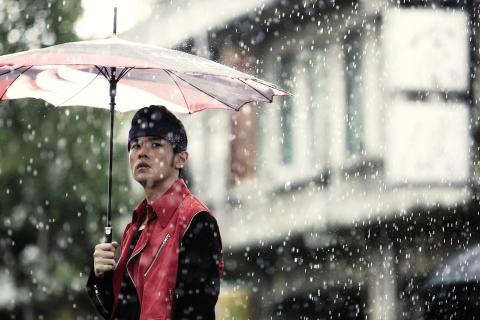
Photo courtesy of Chuang Ying Picture
By night, the friends return home to the titular Rooftop, a ramshackle settlement built on top of an old building in the seedy part of town. Though penniless, the rooftop’s dwellers are a cheerful gang, ready to burst into song and dance at any time and take care of each other like a big family.
Wax’s blithe life changes when he meets his dream girl Starling — played by newcomer Li Xinai (李心艾) from China — who has been forced into the entertainment business by her gambling father (Hong Kong’s Chung Chun-to, 鍾鎮濤).
Wax soon wins the belle’s heart, but their innocent love doesn’t last long. Facing the rich and corrupt movie star William (Taiwanese singer Darren, 邱凱偉), who salivates over Starling’s beauty, and a band of much more sinister mobsters, the hero must prove his mettle and save the girl from falling into the hands of the wicked.
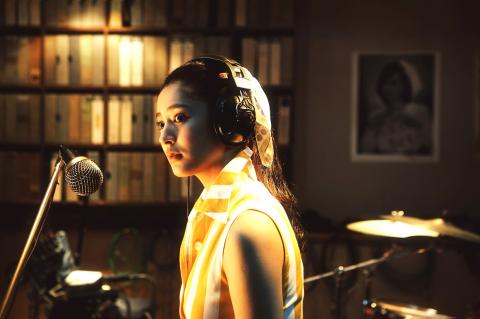
Photo courtesy of Chuang Ying Picture
Credited as director, scriptwriter, actor and songwriter, Chou successfully creates a visually opulent fairy tale bursting with retro sensibilities, with a little help from his top-notch international production crew including cinematographer Mark Lee (李屏賓).
Vintage cars, disco colors and hippie-inspired fashion fill every frame, while the meticulous work of multi-award winning costume designer Wu Li-lu (吳里璐) renders the movie a male version of Sex and the City.
The same amount of effort is invested in crafting the movie’s atmosphere. From the bright neon lights at Bo’s pharmacy, to the romantic backdrop on the rooftop that recalls Baz Luhrmann’s Moulin Rouge!, the ornate sets by the internationally acclaimed art director Akatsuka Yoshihito from Japan — whose works include Kill Bill I and Seediq Bale (賽德克巴萊) — firmly root the movie in a fantastic realm with all traces of reality removed.
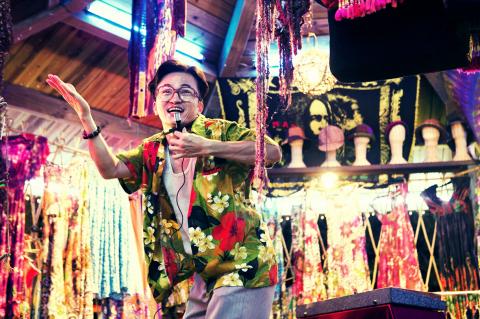
Photo courtesy of Chuang Ying Picture
A spectacular example is the night market scene at which the love between Wax and Starling buds. Built from scratch in a scenic area in Greater Tainan, the bustling night market looks like a glittery mirage floating on a lake, accessible only by swan-shaped paddleboats.
To Chou’s credit, the movie is not short on audiovisual wonders, which are part of any musical’s allure. The musical numbers are masterfully choreographed and occasionally show off Chou’s well-trained biceps. Sometimes, stunning visual effects are not created with a computer, but by ingenious camera work and clever art design.
The technical perfection, however, cannot make up for the absence of genuine emotions and feelings necessary for keeping viewers engaged and moving along with the melodramatic flow. The Rooftop is essentially all about Jay Chou, the Mando-pop king. His part doesn’t demand much acting: Chou plays himself and spends considerable screen time wooing the girl, who doesn’t do much except smile sweetly, and hanging out with his real-life buddies such as Devon Song (彈頭). The rest of the movie is Chou’s fantasy come true: He is the martial-arts hero who beats up bad guys and saves the beauty. Unfortunately, neither the star nor his fantasy is particularly interesting.
With hackneyed plots and wooden performances by the two leads, Chou’s The Rooftop remains a glossy confection, impressive at first sight but quickly forgotten.
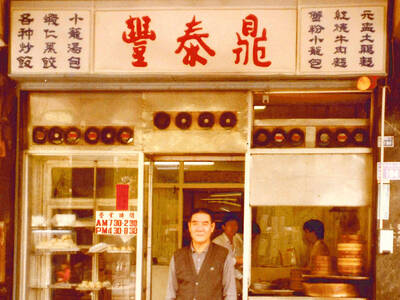
March 24 to March 30 When Yang Bing-yi (楊秉彝) needed a name for his new cooking oil shop in 1958, he first thought of honoring his previous employer, Heng Tai Fung (恆泰豐). The owner, Wang Yi-fu (王伊夫), had taken care of him over the previous 10 years, shortly after the native of Shanxi Province arrived in Taiwan in 1948 as a penniless 21 year old. His oil supplier was called Din Mei (鼎美), so he simply combined the names. Over the next decade, Yang and his wife Lai Pen-mei (賴盆妹) built up a booming business delivering oil to shops and
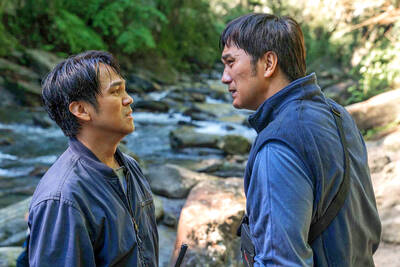
Indigenous Truku doctor Yuci (Bokeh Kosang), who resents his father for forcing him to learn their traditional way of life, clashes head to head in this film with his younger brother Siring (Umin Boya), who just wants to live off the land like his ancestors did. Hunter Brothers (獵人兄弟) opens with Yuci as the man of the hour as the village celebrates him getting into medical school, but then his father (Nolay Piho) wakes the brothers up in the middle of the night to go hunting. Siring is eager, but Yuci isn’t. Their mother (Ibix Buyang) begs her husband to let

The Taipei Times last week reported that the Control Yuan said it had been “left with no choice” but to ask the Constitutional Court to rule on the constitutionality of the central government budget, which left it without a budget. Lost in the outrage over the cuts to defense and to the Constitutional Court were the cuts to the Control Yuan, whose operating budget was slashed by 96 percent. It is unable even to pay its utility bills, and in the press conference it convened on the issue, said that its department directors were paying out of pocket for gasoline

On March 13 President William Lai (賴清德) gave a national security speech noting the 20th year since the passing of China’s Anti-Secession Law (反分裂國家法) in March 2005 that laid the legal groundwork for an invasion of Taiwan. That law, and other subsequent ones, are merely political theater created by the Chinese Communist Party (CCP) to have something to point to so they can claim “we have to do it, it is the law.” The president’s speech was somber and said: “By its actions, China already satisfies the definition of a ‘foreign hostile force’ as provided in the Anti-Infiltration Act, which unlike